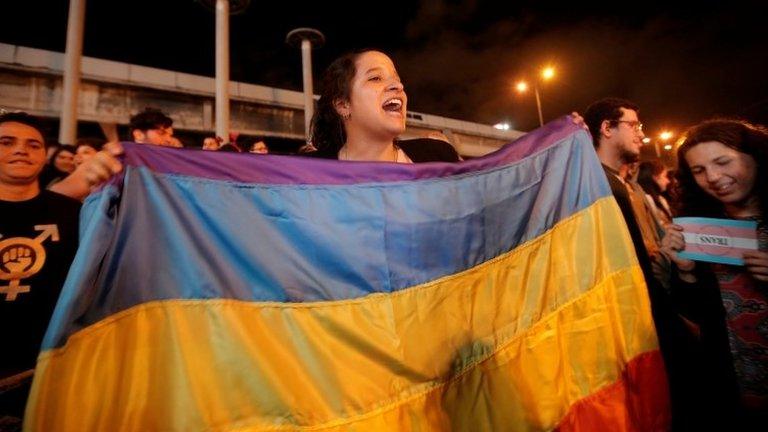Colombia LGBT: The shop that wants men to 'leave behind shyness'
- Published
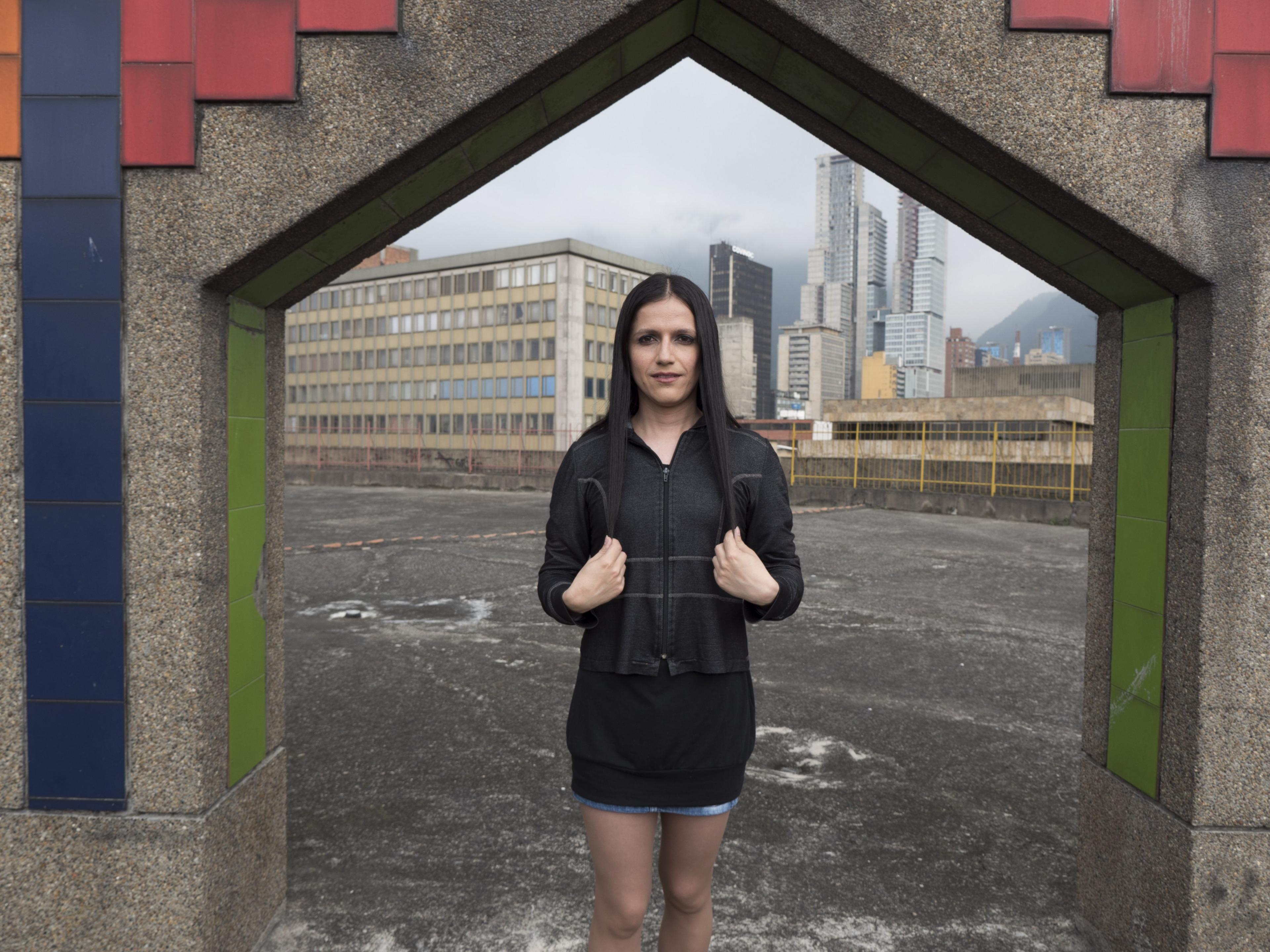
Andrea (not her real name) is one of the customers who frequents Tranxtienda
Pinned to the glass door of Tranxtienda, a clothes shop tucked away on the third floor of an aging concrete mall in the Colombian capital Bogotá, a sign reads: "If this door is closed, DON'T BE SCARED."
Behind the glass door is an array of flamboyant clothes, fake nails, wigs and men-sized heels designed in-house for the city's transvestite community.
But what makes Tranxtienda stand apart from any other place is that it caters to mostly heterosexual men who are in the closet and acts as a store-cum-social club in the heart of downtown Bogotá.
"I come here as often as I can," says Valentina, a regular of Tranxtienda. She uses her pseudonym out of fear of being recognised but apologises for the secrecy with a shy smile.
Fear of being recognised
Today she does not have time to "transform" herself, she explains; instead she has come to sit in the store's petite make-up room to socialise on a bustling Saturday afternoon.
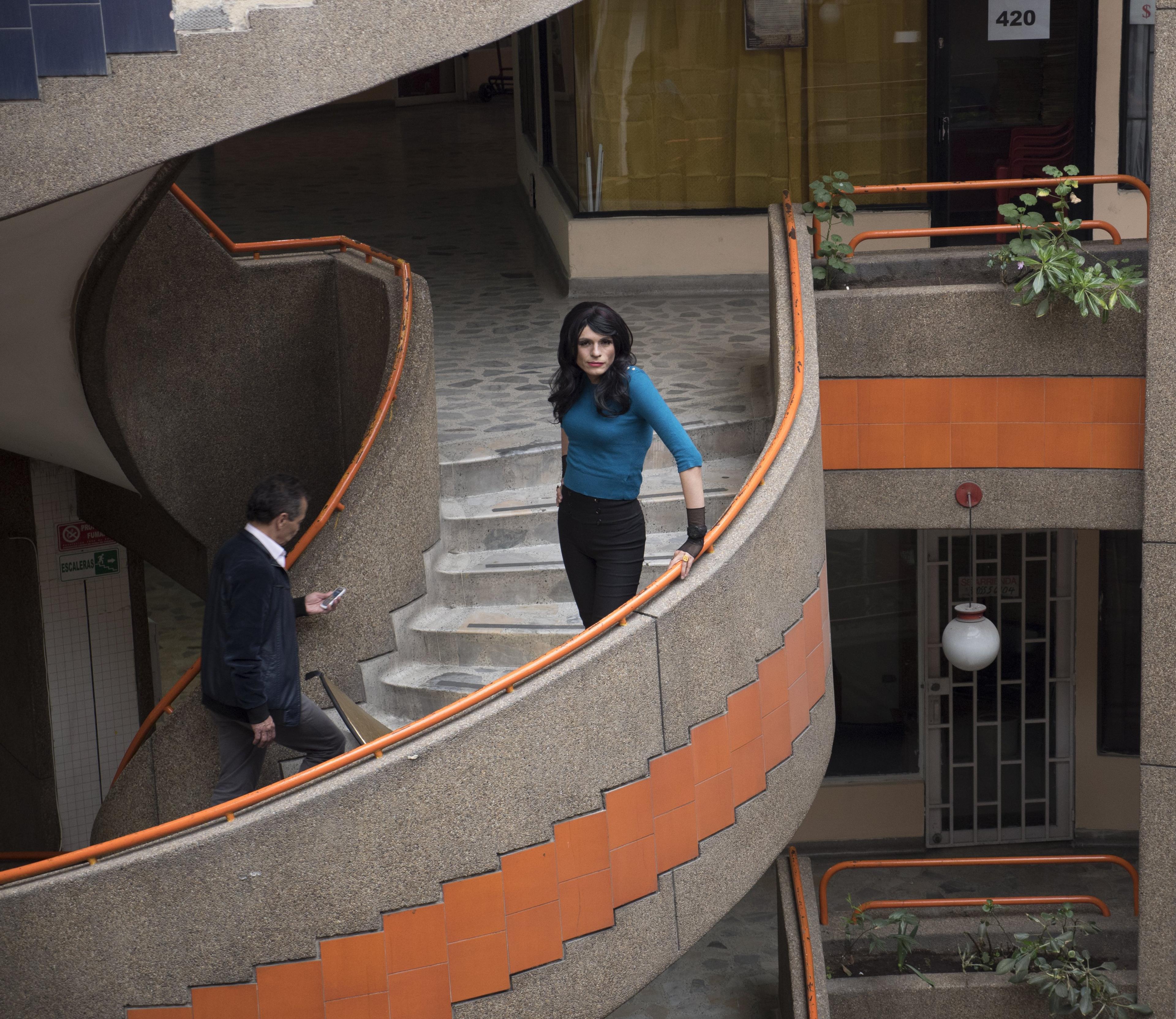
Katherine (not her real name) strikes a pose in the mall where Tranxtienda is located
"I feel happiest when I'm dressed as a woman," says Valentina. "The rest of the time I feel like I'm acting in a play dressed up as a man," she adds.
Valentina explains that she has never come out to her family or partners, and likely never will.

You may also be interested in:

While she shares these details, another customer in full drag shies away from interaction in the adjacent locker room, which customers rent from Tranxtienda for a small fee, and where they often spend the day for fear of being recognised outside.
But recognition by friends and family is not the customers' only worry. The store is also located in a run-down and dangerous side of town. A few streets away is the red light district, where transvestites run the risk of being mistaken for sex workers or treated violently.
Bogotá and Colombia as a whole have a thriving mix of subcultures but dressing in drag or being lesbian, gay, bisexual and trans (LGBT) still carries very real risks. Minority rights non-governmental organisation Colombia Diversa estimates that 440 LGBT people were murdered between 2013 and 2016.
'Exploring their femininity'
Tranxtienda is divided into three shops:
One where clothes and accessories are bought or rented
Another where customers can have their make-up done as well as rent a locker space to change out of their clothes
A workshop where Derly Lineras, the owner, and her partner, Zahira, design and tailor outfits
The more daring customers at Tranxtienda stroll around the mall in full drag and make-up, and others venture out to the street, or go out to party on the weekend.
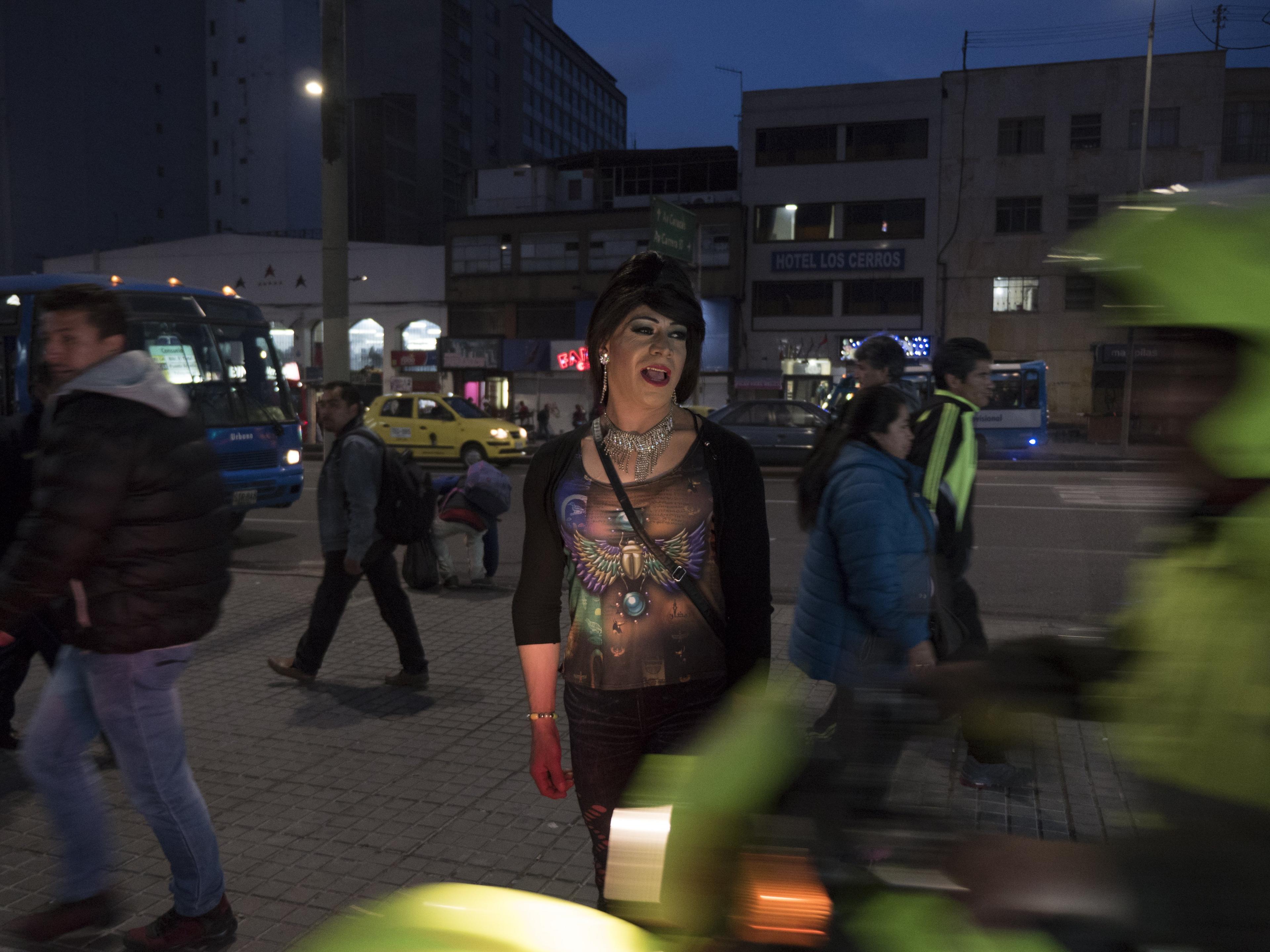
Yuri is one of Tranxtienda's customers who is happy to show off her outfits in the street
"The baptism here is buying bread from over the road at the bakery," says Ms Linares, chuckling. "The people at the bakery enjoy meeting the newcomers."
But the point, explains Ms Linares, is that there are a safe haven and support network for anyone wanting to dress in drag. "Some customers aren't even transvestites, they just come to explore their femininity," she says.
Ms Linares opened the store seven years ago in order to provide a place where men could buy women's clothes without any hassle.
"I first thought of it as a business, but then it turned into a social project because I realized how much people needed support. Unfortunately we can't count on government support," says Ms Linares, referring to what she says is an absence of adequate psychological and medical support for trans people in Colombia.
Ms Lineras is a poster child for LGBT rights in Bogota. She was born a man, became a woman and had a child with her partner, Zahira, whom she met shortly after opening the store.
She is currently working alongside the mayor's office to raise awareness for LGBT people in Bogotá.
Social stigma
Ms Lineras gave everything up in her life after coming out as a trans woman: her men's clothes, her closest friends, and finally her work. But the store quickly took off, filling a much needed void, she explains.
At first her neighbours shunned her, and wanted her out of the mall, but with time they came around to accept her. "Though it was by no means easy," she says.
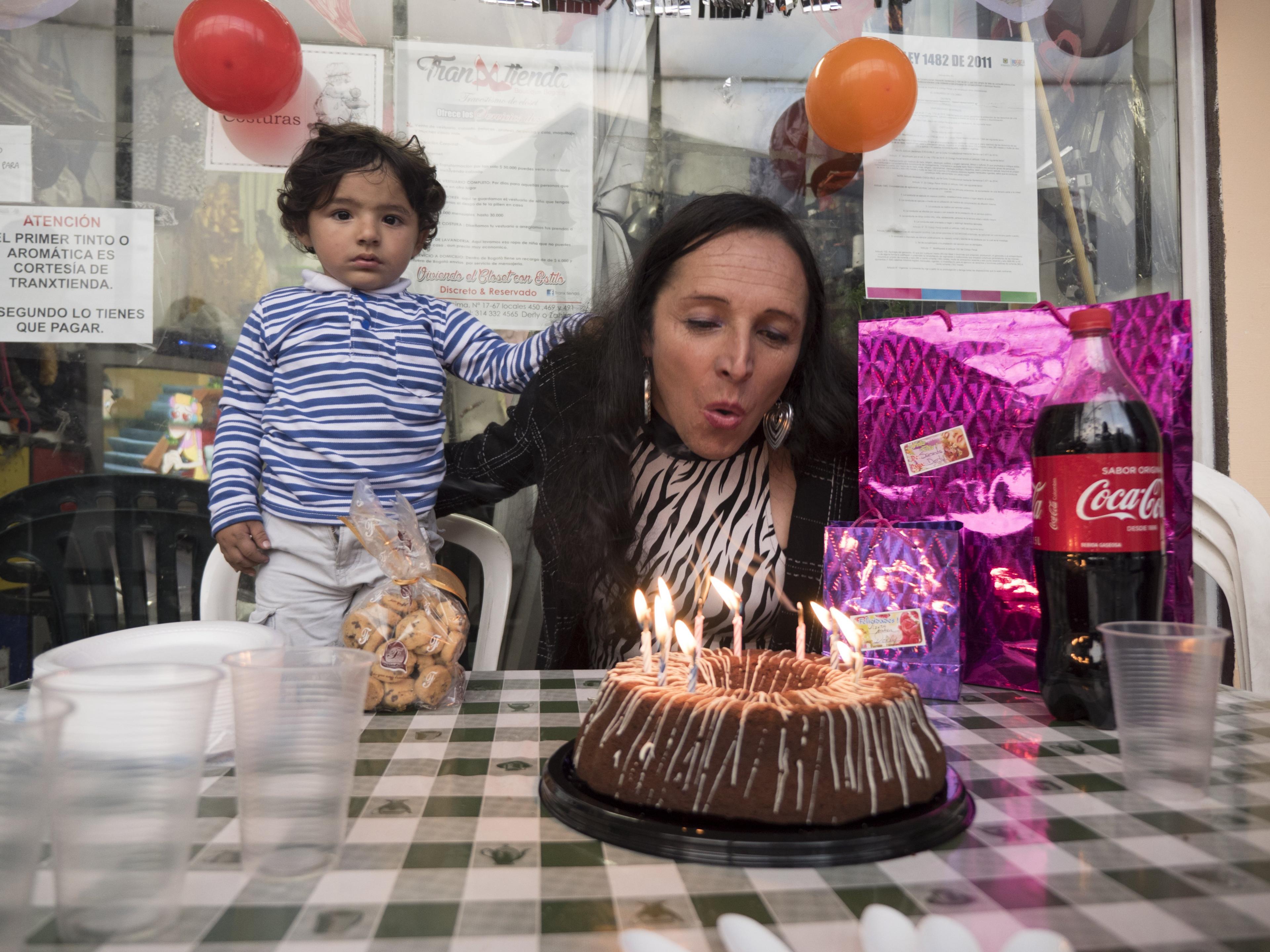
Derly Linares says her son helped break the ice with at least one neighbour
Ms Lineras recalls fondly that it was it was thanks to her three-year old son "that the ice was broken" with her most intransigent neighbour when her son just wandered into the neighbour's office on his own one day and befriended him.
She says that there have been important advancements for LGBT people. Colombia recently legalised same-sex marriage and also allows trans people to change their name and gender marker.

Western hemisphere countries where same-sex marriage is legal:
Argentina
Brazil
Canada
Colombia
Mexico (certain states only)
US
Uruguay

But more practical help for transgender people to access basic public services is virtually non existent and social stigma remains one of the most pernicious obstacles in the way of progress, Ms Linares argues.
"People think of us as thieves and criminals, or worse. But we're fighting to get rid of that stigma."
What is more, with highly polarized presidential elections coming up on 27 May, minority rights advocates worry that progressive LGBT laws could be shelved or even rolled back by politicians who fear the political costs of such a stance amid a swelling conservative mood around the country.
- Published10 January 2018
